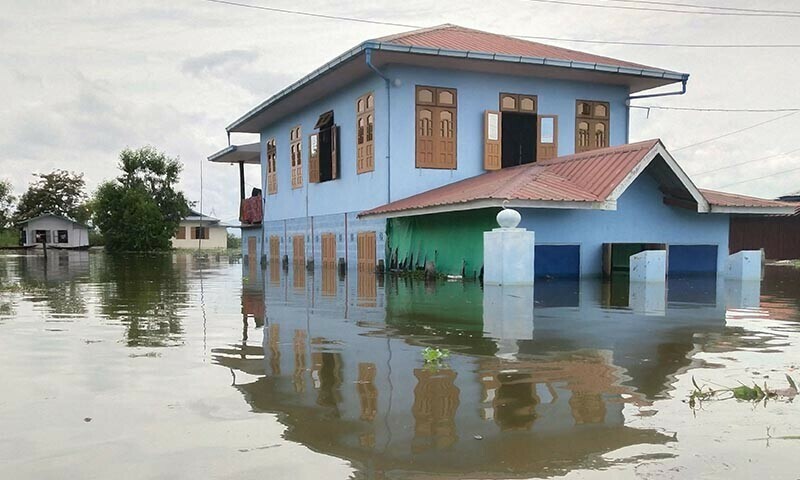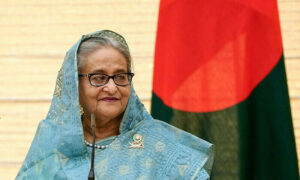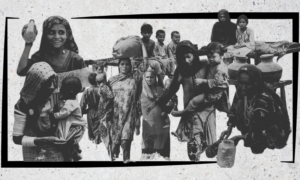Volunteers rushed to areas inundated by floods in Myanmar on Sunday as the country’s death toll from the Typhoon Yagi deluge surged to 113 and remote areas reported increasing numbers of dead and missing.
Floods and landslides have killed more than 400 people in Myanmar, Vietnam, Laos and Thailand in the wake of Typhoon Yagi, which hit the region last weekend, according to official figures.
However, with roads and bridges damaged in Myanmar and phone and internet lines down, information has been limited.
One man told AFP how he had tried to rescue people with ropes as floodwaters four metres high surged through the hill town of Kalaw in Shan state on September 10.
“The current was very strong and even some buildings were destroyed,” he said, describing pieces of furniture being washed through the streets.
“I could see trapped families in the distance standing on the roofs of their houses,” said the man, who works for a local non-governmental group. “I heard there were 40 bodies in the hospital,” he said.
A businesswoman in Yangon who runs a company in Kalaw told AFP that her staff there had reported nearly 60 people had been killed in the town. The junta said on Sunday the death toll had jumped to 113 by Saturday night. The previous toll had been put at 74.
It did not specify whether any of those confirmed dead had been killed in Kalaw.
More than 320,000 people had been displaced and moved to “temporary relief camps”, junta spokesman Zaw Min Tun said.
At Inle Lake, a tourist hotspot about 30 kilometres from Kalaw, flood levels had risen on Saturday to the second storey of houses built on stilts above the water, according to one man there helping to evacuate his family.
“Whole villages have been submerged” in some areas near the lake, he told AFP on Sunday, asking to remain anonymous.
“The elders say this is the highest level of flooding they have seen,” he said.
Cars and trucks carrying volunteers were streaming north from the commercial hub Yangon to reach affected areas in Taungoo in the Bago region and around the capital Naypyidaw, AFP reporters said.
The vehicles were loaded with pallets of bottled water, bundles of clothes and dried food. Some had boats strapped to their roofs. “We want to help anyone who needs help at the moment. That is why we arranged to go to the flooding area,” said one woman heading for Taungoo.
More misery
The floods have added to people’s miseries in Myanmar, where millions have already been displaced by more than three years of war since the military seized power in 2021.
Residents of the Yado displacement camp in eastern Karen state were forced to flee their temporary homes after torrents of water ripped through the camp.
Belto, a resident of the camp, said the waters had washed his house away, along with his sister who was inside trying to retrieve their money.
“She was taken by the water… and she got injured,” he told AFP on Saturday.
“We are already displaced people from war zones and after the floods, we don’t have anything left… But we are not the only ones who face this fate, all families are facing difficulties.”
The Sittaung and Bago rivers, which flow through central and southern Myanmar, were both still above dangerous levels, state media said, although water levels were expected to fall in the coming days.
In the east, the Thanlwin River was more than two metres above its danger level in the state capital Hpa-an on Saturday, state media reported.
Thailand’s weather office warned Sunday of further heavy rain in provinces along the Mekong river.
Authorities in Vietnam gave an updated toll on Sunday of 281 dead and 67 missing.
Request for aid
Myanmar’s junta chief made a rare request for foreign aid to deal with the floods, state media reported on Saturday. The military has previously blocked or frustrated humanitarian assistance from abroad.
It suspended travel authorisations last year for aid groups trying to reach
around a million victims of powerful Cyclone Mocha.
The United Nations’s Office for the Coordination for Humanitarian Affairs in Myanmar and the International Committee of the Red Cross told AFP on Saturday they could not comment on the junta’s request.
Heavy monsoon rains lash Southeast Asia every year but human-made climate change is causing more intense weather patterns that can make destructive floods more likely.







